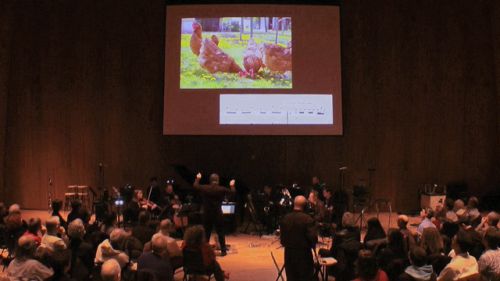 United States “American Stories”: Rutty, Ludwig, Paterson, McClowry, Mackey: Sean McClowry (double bass), American Modern Ensemble, Robert Paterson (conductor), DiMenna Center, New York City. 25.3.2013 (DS)
United States “American Stories”: Rutty, Ludwig, Paterson, McClowry, Mackey: Sean McClowry (double bass), American Modern Ensemble, Robert Paterson (conductor), DiMenna Center, New York City. 25.3.2013 (DS)
Alejandro Rutty: Black Box Bossa (NY premiere)
David Ludwig: Flowers in the Desert
Robert Paterson: Looney Tunes (NY premiere)
Sean McClowry: Concerto for Double Bass and Chamber Ensemble (NY premiere)
Steven Mackey: Groundswell

First off, this concert was fun, and the house was packed. If there is, in fact, an audience-building issue in the new music scene, part of it may be that the enjoyment factor is left out of the discussion. The conversation is always about whether people are used to hearing this kind of music, if they understand it, or if they are open to it. But at the recent American Modern Ensemble performance in the lusciously wooden cave-like DiMenna Center on the western edge of 37th Street, the most prevalent impression I walked away with was that I’d come to a really fun party, with the music as the entertainingly rousing guest of honor. (And, of course, there was wine—good wine at that.)
Second, the players were excellent. Of course many, like pianist Stephen Gosling and clarinetist Benjamin Fingland, are well-known staples of the New York new music scene. Okay, so nothing new, you might say. But the tight chamber playing and the intense communication passed between artists who’ve played together a lot brought out the bang in each piece. From the most silent moments to the most joyously skittish, I was sucked into the mood evoked by each. Listening to and watching the musicians of the American Modern Ensemble is like experiencing a “perfect ten” dance team with the mystical element of music emanating from their own bodily movements. This is the way to hear new music—when each work is in a symbiotic relationship with those playing it. These musicians have the brazen audacity to interpret the new (for new music takes courage). Their adventurousness is addictive.
Third, the composers were not only great, they were present and engaged. During an intermission panel, which had the delight of a child’s anticipated nightly story time, they regaled us with their anecdotes on composition. The audience swooned when Princeton composition Chair Steven Mackey, with his endearing smile and pre-hipster coolness, turned to us and said “When things are beautiful, they make me sad. If you can’t have sex with it and you can’t eat it, what do you do?” Apparently, you write a grand piece engulfing it, which is exactly what he did with Groundswell, his own sexually yummy rendition of traveling through the topographic varieties of sea-to-Alpine terrain.
Robert Paterson conducted the uproariously fun New York premiere of his Looney Tunes, set to photos and cartoon stills, which gave post-modern definition-shifting and slippery subject recognition a fresh face. Sean McClowry performed the solo in his Concerto for Double Bass and Chamber Ensemble (also a New York premiere), not only letting us in on his passion for the instrument, but giving us a first-hand view of how his playing directs his composing; it was like watching the process unfold, both intimate and sensual. And in the evening’s most sober interlude, David Ludwig wrote a moving essay to accompany his five-movement Flowers in the Desert, an answer to an Oklahoma news story about the controversial, draconian self-defense murder of two underage muggers.
Alejandro Rutty reminded everyone that “the act of composing needs to be fun.” This was heartily evoked by Black Box Bossa (which won AME’s 2012 composition competition) and its mix of sultry tropical moods with eclectic textural samples. We couldn’t help but dance in our seats and chuckle at motifs because, after all, the act of listening—well, it needs to be fun, too.
Daniele Sahr